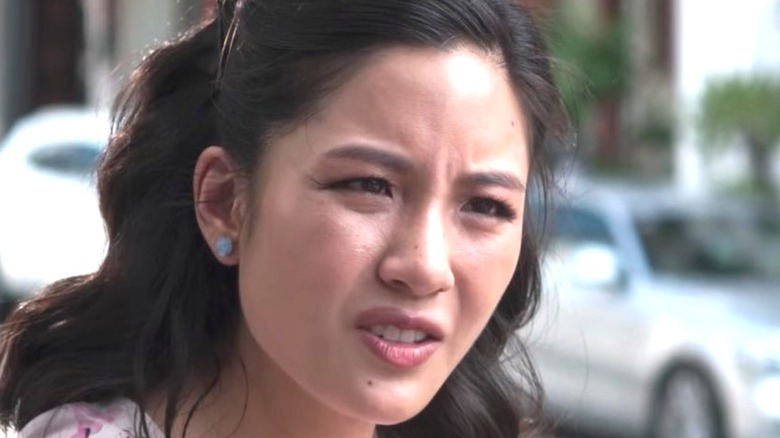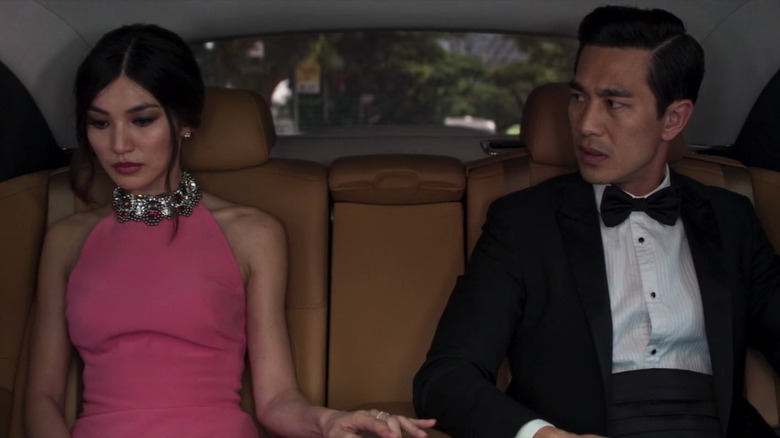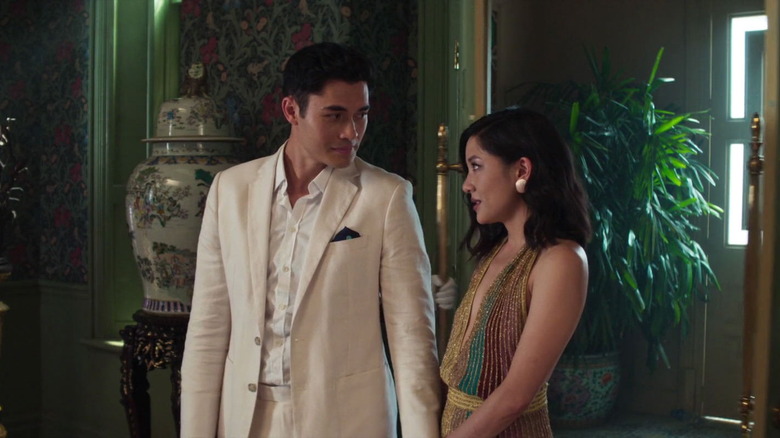How Crazy Rich Asians Differs From The Books
Jon M. Chu's "Crazy Rich Asians," adapted by Peter Chiarelli and Adele Lim, was a massive hit when it was released in 2018. According to Box Office Mojo, the film made over $238 million worldwide in box office sales. It was a critical success as well, earning a current score of 91% on Rotten Tomatoes.
The film centers on economics professor Rachel Chu (Constance Wu), who is invited by her boyfriend of about a year, Nick Young (Henry Golding) to join him in Singapore, where his family lives, for his best friend's wedding. While on the trip, Rachel is shocked to learn that Nick's family is incredibly wealthy — crazy rich, in fact — and incredibly famous members of high society. Rachel, realizing she is dating one of the country's most sought-after bachelors, then finds herself having to face pressure from the public, Nick's circle, and, most of all, his overbearing and cold mother, Eleanor (Michelle Yeoh).
"Crazy Rich Asians" was bound to be a hit — not only does its all-Asian cast fill a representation gap in Hollywood long overdue to be filled, but its source material, the novel by Kevin Kwan, was a massive success. As of 2016, when news of the film adaptation was announced, the novel had about a million copies printed worldwide (via NBC News). And the release of the film only helped the sales of the novel — in 2018, the novel and its two sequels sold 1.5 million copies just that year, per AP News.
Here's a rundown of the three biggest changes made adapting the novel for the screen.
Michael doesn't cheat on Astrid
In the film, Astrid (Gemma Chan) is one of the most sympathetic characters; not only is she genuinely kind — and a rare friend to Rachel among Nick's circle — but she goes through a terribly hard story arc of being cheated on by her husband, Michael (Pierre Png), and eventually separating.
In the novel, the two do eventually split up, but it goes down quite differently. According to Entertainment Weekly, Astrid does discover that Michael is having an affair — but it's all a ruse. It turns out that Michael only pretends to be having an affair in order to make sure that the two will have an easy divorce because he doesn't like being married to someone of such wealth and high status. For the screen, Michael's affair was very much real and made Astrid's arc of realizing her worth straightforward and better suited for the constraints of a film.
Additionally, the book details Astrid reconnecting with an ex-boyfriend, Charlie Wu, while dealing with her estrangement with Michael. In the film, Charlie remains absent, except for a very brief appearance in the mid-credits scene — in which he is played by Harry Shum, Jr. — as a pointed nod to all the brief characters who may have missed Charlie's role in Astrid's life.
In the books, the Youngs are not famous
As moviegoers know, one of the reasons the Singapore trip is such a shock to Rachel is she finds out that her boyfriend is incredibly famous (on top of being incredibly wealthy). So, not only does she have the pressure of being under the family's eye, but she also has to face public scrutiny. In fact, in the film, Eleanor finds out that Nick is bringing Rachel home with him for the wedding after a woman, who recognizes Nick in a restaurant and overhears him asking Rachel to accompany him, spreads the word — which involves so many people interested in Nick's life that word makes its way all the way to Nick's mother. And when Rachel visits her college friend, Peik Lin (Awkwafina), she gets a crash course on the wealthiest families of the country and learns that there's a difference between old money, like the Youngs, and new money, like Peik Lin's family.
In the novel, according to Entertainment Weekly, one of the major differences between old money and new money is that only new money families are engaged in the kind of public spectacle we see in the film. In fact, Peik Lin and her family have never even heard of the Youngs because they've worked to keep their privacy.
It's easy to see why the change was made for the on-screen version — adding in the public element just ups the pressure for Rachel and, consequently, the stakes of the movie.
The ending is a bit different
The movie concludes as one would expect a romantic comedy to: with the couple getting back together after having to fight through various hurdles. Initially, Rachel turns down Nick's first proposal because she doesn't want to make him choose between her and his family (seeing as Eleanor still doesn't approve). But, after seeing how much Rachel cares about Nick, Eleanor does give her blessing — and her emerald ring — and Nick proposes again, to which Rachel accepts. The film ends with Rachel and Nick arriving at a huge party to celebrate their engagement.
However, the book ending leaves a few questions unanswered, as reported by Slate. Namely, Nick doesn't propose at the end of the novel, leaving book readers wondering if he'll come around to asking the woman he loves to marry him even though his family may not approve. And, if he does propose, will Rachel say yes? And what will his family think? Also, will Eleanor ever accept Rachel?
All of this is wrapped up in the film, neatly tying everything up — likely in case the film didn't do well and they didn't get to make a sequel. Lucky for us, a sequel is in the works and there is still plenty of material to tackle with Rachel and Nick now officially getting married. We can't wait to see the story continue to play out on screen — and see what differences are made from Kwan's sequel novel, "China Rich Girlfriend."



